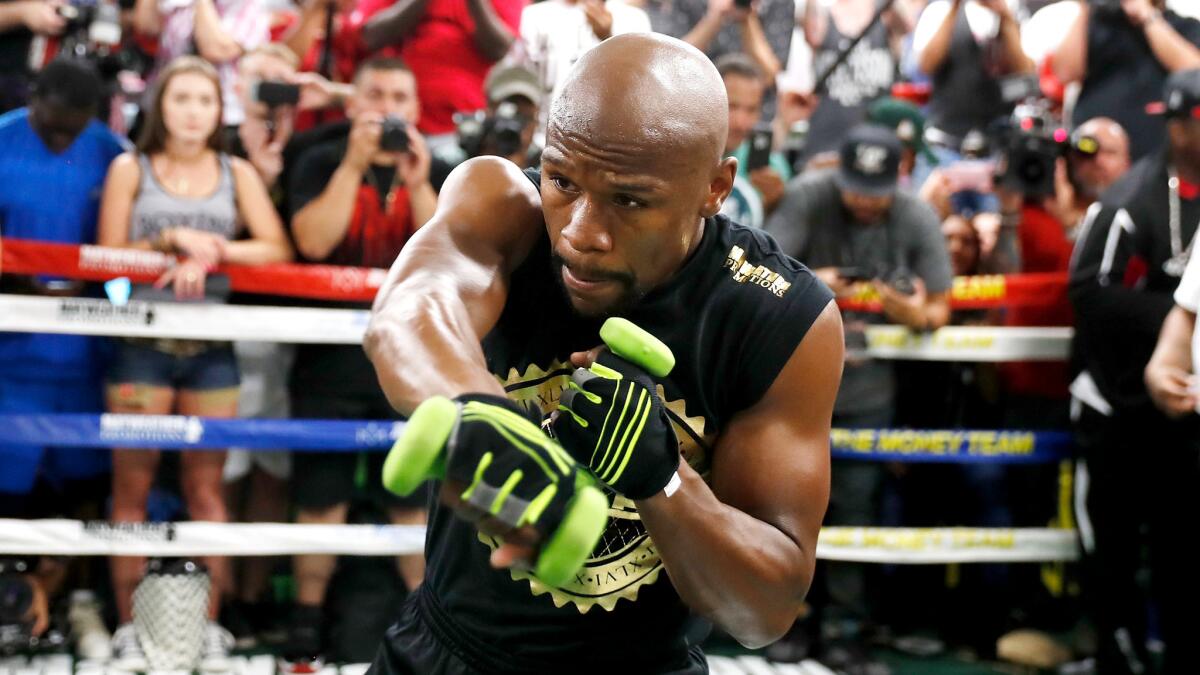How Floyd Mayweather Jr. transformed from ‘Pretty Boy’ to ‘Money’

- Share via
Reporting from Las Vegas — Part of the novelty of Floyd Mayweather Jr. and Conor McGregor fighting is the fact that McGregor, cognizant or not, has followed the Mayweather road to riches.
“I’ve been doing the mink coats and the flashiness ... that was years ago,” Mayweather told reporters at a recent media day session touting his Aug. 26 showdown against UFC champion McGregor, who has taken to driving around in a Rolls Royce and Bentley to hype his wealth.
But the difference, Mayweather said, is that with him, the image he portrays is real, not rented.
“Myself, this is genuine. This is real. Any Lamborghini you see me in, you know I own it. Any mansion you see me in, you know it’s paid for,” Mayweather said.
But a little more than a decade ago, right around the time he was 29 years old like McGregor, Mayweather found himself in a very different place.
Immensely talented and confident his personality had universal appeal, Mayweather was less important to his promoter, Bob Arum, than Oscar De La Hoya.
In flashes, Mayweather would reveal his confidence. Like listening to HBO commentator Jim Lampley talk of the coming 2005 AFC Championship during Mayweather’s fight against Henry Bruseles, and then voicing his correct prediction that “the Patriots” would win, seconds before stopping Bruseles in the eighth round.
But the 1996 U.S. OIympian’s personality has caused him some problems.
When then-HBO executive Lou DiBella offered him a $16 million deal in 1999, Mayweather vented to New York Daily News reporter Tim Smith that it was a “slave contract.”
“He was in my office. Arum was convinced the real marketability lied with the Latino market and Floyd was frustrated by that,” DiBella said. “I thought I’d offered Floyd a nice contract.”
Mayweather made his case to DiBella: “I’m not like another guy. I’m going to be one of the greatest fighters of all time. I’m never going to lose. I’m going to make more money than any fighter in history.”
Said DiBella: “I liked him having that sense of himself in what’s a very hard business, but I thought he was out of his … mind.”
DiBella told Mayweather that day, “Floyd, maybe you’re right, but I’ll make a deal with you: If we walk through Times Square right now and 10 people recognize you, I’ll renegotiate the deal.”
Mayweather didn’t say anything. Even though he was on the pound-for-pound list, Mayweather had languished through five consecutive nondescript bouts, including in the start of a new HBO deal that opened with a humbling Sunday afternoon fight in Detroit in late 2000.
“I don’t know if anyone saw that vision other than him,” Smith said.
Even after Mayweather’s impressive 10th-round TKO of Diego Corrales in 2001, the crowd that filled his main-event bout later that year in San Francisco was mostly Filipino as Manny Pacquiao fought on the undercard.
Finally, upon defeating Zab Judah in 2006, Mayweather made what some view as the seminal move of his career, buying himself out of his contract with Arum for $750,000 and proceeding a year later to a showdown with De La Hoya after aligning with manager Al Haymon.
“Floyd Mayweather has never been struggling, let’s clean that up right now,” Mayweather said in a Thursday conference call. “Me and Al Haymon joined forces because he saw not just a fighter, but a person – very articulate and smart inside and out of the ring.
“I had done good numbers before Al Haymon, but when we came together, we had a game plan. And then everything came to be.”
Ross Greenburg, the former president of HBO Sports and current executive producer of Showtime’s boxing reality series “All Access”, recounted how Haymon set up a meeting in Las Vegas at MGM Grand in which Mayweather told him, “I’m going to be the biggest star in the sport. Line ’em up and let’s go.”
“He didn’t have to do that big of a sales job. I knew the talent he had. But from that moment on, we lined up the fights – except for Pacquiao, which took awhile -- and Floyd made the rest history,” Greenburg said.
Greenburg was developing a reality boxing show like the NFL’s “Hard Knocks” when Mayweather pleaded with him to turn the cameras on his colorful lifestyle, which happened with the launch of “24/7” advancing the De La Hoya fight.
With the powerful lead-in of “Entourage” and “The Sopranos,” the series debut posted record ratings as Mayweather stole the show by criticizing De La Hoya, training in post-midnight runs, interacting with his entertaining family and throwing cash at the camera while transforming from “Pretty Boy” Floyd to “Money” Mayweather.
“Pretty Boy is a nickname some white guy is going to give Floyd. Money was a nickname Floyd gave himself and the creation of his ‘The Money Team’ showed Floyd had a strong sense of how to build his popularity in the urban market,” DiBella said.
By defeating De La Hoya by split-decision, then knocking out Ricky Hatton later in 2007, Mayweather became the sport’s king, and he revealed last week that he then staged a mock retirement to heighten the anticipation for his return in 2009 against Juan Manuel Marquez.
During his layoff, he performed in a WWE match and gained more mainstream interest by appearing on “Dancing With the Stars.”
“Love him or hate him, you have to watch him,” Greenburg said. “He was right about what he was going to do – tenfold. I never imagined the amount of money he’s generated. He’s carried the sport on his back, and it’s been one of the great rides in the history of the sport.”
The six-fight Showtime deal, now extended to seven for Saturday’s novelty bout against McGregor, featured the record-setting pay-per-view (4.6 million buys) for Pacquiao and a 2013 victory over Canelo Alvarez.
Showtime Executive Vice President Stephen Espinoza said the McGregor fight should allow Mayweather to surpass $1 billion in pay-per-view sales with the network.
Mayweather has said he could pocket $350 million from fighting McGregor, with the Irishman hopeful to earn $100 million.
Official retirement now beckons as Mayweather seeks to raise his record to 50-0, and he’s been reflecting on his storied career.
At the New York tour stop last month, Mayweather ran offstage to deliver a bear hug to DiBella and told his children, “I told this man years ago I’d never lose, that I’d make all this money.
“And here we are.”
Twitter: @latimespugmire
More to Read
Go beyond the scoreboard
Get the latest on L.A.'s teams in the daily Sports Report newsletter.
You may occasionally receive promotional content from the Los Angeles Times.











